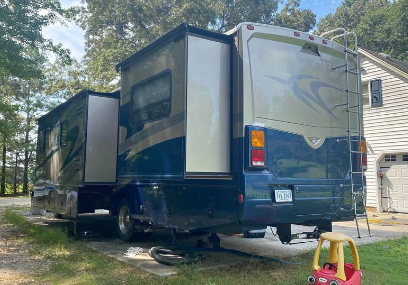Do RVs Have Air Conditioning?

This entry was published on December 17, 2023 by Kevin Pommells
Most modern RVs feature rooftop air conditioners that allow rvers to enjoy good temperatures no matter the season. These units, available in high or low profile, are especially beneficial for smaller campers, saving precious interior storage space. While they increase the overall height and clearance of the vehicle, the availability of low profile options minimizes this concern. Rooftop units typically offer a choice between non-ducted and ducted air conditioning.
Exploring RV Cooling Options
One of the first questions that pop up for campers is, "Can you run an air conditioner in an RV?" The answer is a resounding yes!
| AC Type |
Power Source |
| Rooftop AC Units |
Electricity/Solar |
| Portable AC Units |
Various (Electricity/Solar, Generator) |
| Window-Mounted AC Units |
Electricity/Solar |
Running your AC on electricity is common, but it's essential to choose the right type based on your RV's setup.
Are RVs Climate Controlled?
Understanding RV Climate Control
RVs, by design, provide a degree of climate control. Check out the key aspects of RV climate control:
| Climate Control Features |
Description |
| Insulation |
Maintains temperature in different weather |
| Ventilation |
Ensures proper air circulation |
| Heating Systems |
Keeps you warm during colder seasons |
Understanding these features helps you maximize your RV's climate control capabilities.
Do RV Air Conditioners Run on Electricity?
Unveiling the Power Behind RV AC Units
Yes, RV air conditioners primarily run on electricity. However, the power consumption varies. Let's break down the electricity consumption of popular RV AC units:
Certainly, here are the first two columns of the table:
| RV Air Conditioner |
Wattage |
| Atwood Air Command |
1265 |
| Coleman-Mach 3 Power Saver |
1070 |
| Furrion Chill |
1620 |
| Dometic Penguin II High Efficiency (Low Profile) |
1300 |
Knowing your AC unit's power requirements helps you plan your energy needs during your outdoor adventures.
Here are some wattage ratings based on the BTU ratings of different rv ac units. The table will list the ratings from 15,000BTUs down to 7,000BTU.
| Rating In BTU |
Running Wattage |
Starting Wattage |
| 7000 BTUs |
900 Watts |
3500 – 4000 Watts |
| 9000 BTUs |
1100 Watts |
4500 – 5000 Watts |
| 10000 BTUs |
1200 Watts |
5000 – 6000 Watts |
| 12000 BTUs |
1500 Watts |
6000 – 7000 Watts |
| 13500 BTUs |
1800 Watts |
6500 – 7500 Watts |
| 15000 BTUs |
2000 Watts |
7000 – 8000 Watts |
These columns represent the BTU rating, potential running wattage, and potential
How Can I Keep My RV Cool Without Air Conditioning?
Cooling Alternatives for Every Camper
While air conditioning is fantastic, there are alternative methods to keep your RV cool without relying solely on AC:
| Cooling Method |
Description |
| Shade |
Park your RV strategically for natural shade |
| Ventilation |
Use fans and open windows for airflow |
| Reflective Surfaces |
Install reflective materials to reduce heat |
Explore these alternatives for a well-rounded cooling strategy, especially in off-grid camping situations.
Factors to Consider
Choosing the Right AC Capacity
When selecting an air conditioner for your RV, consider factors like the size of your RV. Matching the AC capacity to your RV's dimensions ensures optimal cooling efficiency.
Traveling Tips with RV Air Conditioning
Hit the Road with Confidence
Traveling with RV air conditioning requires a strategic approach. Follow these tips for a cool and enjoyable journey:
- Check AC settings before departure.
- Plan your route with climate in mind.
- Service your AC unit regularly for optimal performance.
Portable Solutions
Flexibility with Portable ACs
Portable air conditioners offer flexibility for campers. It's in you best interest to think about the different pros and cons before choosing one that suits your needs. Here are some recommendations:
- Compact and efficient.
- Ideal for off-grid adventures.
Subscribe
Stay updated with our newsletter
Conclusion
Achieving the perfect climate in your RV is within reach with the right knowledge and equipment. Whether you choose a traditional rooftop unit or opt for a portable solution, CamperRules is here to guide you. Connect with us for more valuable insights and embark on your next outdoor adventure with confidence!

